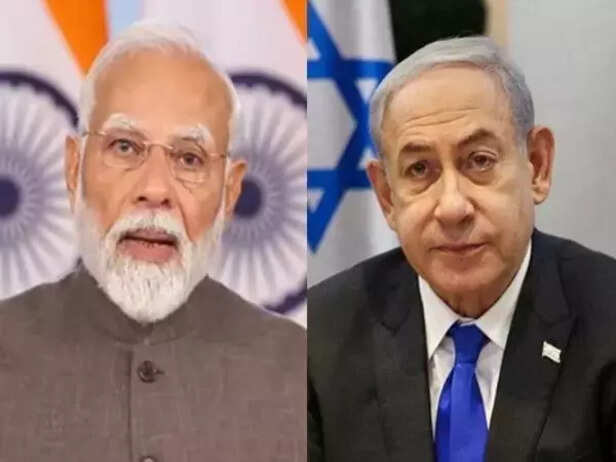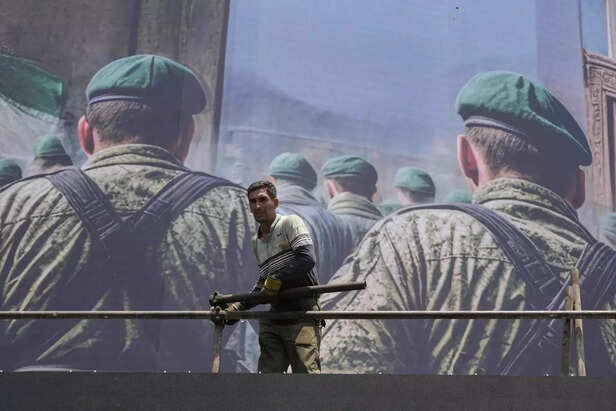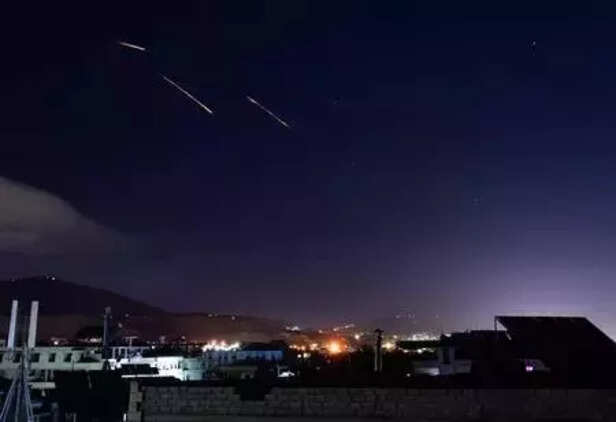8 Million Indians in Danger If Israel-Iran Conflict Goes Nuclear
Nidhi | Jun 14, 2025, 19:04 IST
( Image credit : IANS, Timeslife )
As Israel and Iran edge closer to nuclear war, the threat extends far beyond their borders. Over 8 million Indians living in the Gulf could be caught in the fallout — facing panic, displacement, and danger. India also risks economic shocks, oil supply disruptions, and diplomatic pressure. This isn't just a foreign conflict; it could become India’s crisis too. The question is — will we be ready when it hits?
It won’t take a missile over Delhi for India to feel the shock of a nuclear war.
If Israel and Iran cross the final line — and turn their long-brewing conflict into a nuclear confrontation — the fallout will be felt far beyond Tel Aviv or Tehran. It will ripple across continents, through oil pipelines, trade routes, stock markets, and even the homes of eight million Indian workers in the Gulf.
This isn’t someone else’s war anymore.
With over 200 Israeli fighter jets bombing Iranian military and nuclear targets, and Iran vowing revenge, the region stands on a knife’s edge. The world is bracing for what may follow — but India, in particular, has more reasons than most to be concerned.
From energy security and economic stability to diplomatic pressure and the safety of its citizens abroad, India may be far from the epicenter, but it is dangerously close to the consequences.





 India may not be on the battlefield, but it is certainly within the blast radius of the consequences. The risks are real — from oil price spikes and stock market crashes to geopolitical instability and risks to millions of Indian lives in the Gulf.
India may not be on the battlefield, but it is certainly within the blast radius of the consequences. The risks are real — from oil price spikes and stock market crashes to geopolitical instability and risks to millions of Indian lives in the Gulf.
India must prepare on multiple fronts:
If Israel and Iran cross the final line — and turn their long-brewing conflict into a nuclear confrontation — the fallout will be felt far beyond Tel Aviv or Tehran. It will ripple across continents, through oil pipelines, trade routes, stock markets, and even the homes of eight million Indian workers in the Gulf.
This isn’t someone else’s war anymore.
With over 200 Israeli fighter jets bombing Iranian military and nuclear targets, and Iran vowing revenge, the region stands on a knife’s edge. The world is bracing for what may follow — but India, in particular, has more reasons than most to be concerned.
From energy security and economic stability to diplomatic pressure and the safety of its citizens abroad, India may be far from the epicenter, but it is dangerously close to the consequences.
1. India’s Ties With Both Israel and Iran Make This War Personal

PM Modi emphasises need for early restoration of peace in West Asia in conversation with Israel PM.
( Image credit : IANS )
- India–Israel Strategic Partnership India and Israel share strong defense and technological ties. Israel is among India’s top three arms suppliers, providing cutting-edge weapons, surveillance systems, and cyber intelligence. Cooperation on counter-terrorism has grown significantly, and Prime Minister Narendra Modi's 2017 visit to Israel — the first by any Indian PM — marked a new chapter in bilateral relations. India also benefits from Israeli innovations in agriculture, irrigation, and defense manufacturing.
- India–Iran Economic and Cultural Relations India has long-standing cultural and economic ties with Iran, including energy imports, regional connectivity projects, and historical exchanges. Iran was once among India’s top oil suppliers, and though U.S. sanctions have restricted crude imports, the partnership continues through projects like the Chabahar Port — a strategic access point to Afghanistan and Central Asia. Iran also plays a key role in India’s efforts to maintain regional balance against both Pakistan and China.
2. Israel’s Strike on Iran’s Nuclear Facilities Has Global Implications

Operation Rising Lion, Image credit: Times of India
- Operation Rising Lion and Its Fallout In a surprise move, Israel launched Operation Rising Lion — a coordinated strike involving over 200 fighter jets targeting more than 100 Iranian military and nuclear installations, including the Natanz uranium enrichment site. Though Iran confirmed damage, it denied any radioactive leaks. However, the International Atomic Energy Agency (IAEA) is closely monitoring the situation and has urged de-escalation. The attack raises the terrifying possibility of Iran retaliating — and even invoking its nuclear ambitions in response.
3. Radiation May Not Stop at Borders

Iran Israel Mideast Wars.
( Image credit : AP )
- Environmental Risks Are Low, But Not Zero Experts say that the chance of nuclear radiation reaching India is very low under normal atmospheric conditions. However, extreme events in the past show why complacency is dangerous. In 1986, radioactive clouds from the Chernobyl disaster reached Sweden, more than 1,000 kilometers away. A nuclear explosion, with its much more powerful dispersal capability, could contaminate air or water systems depending on weather shifts and wind patterns.
4. The Real Fallout for India Will Be Economic

Israel's attack on Iran bullish for oil prices but unlikely to last unless exports affected_ Report.
( Image credit : ANI )
- Oil Prices Could Soar Overnight India imports over 80% of its oil — much of it from Gulf nations close to Iran. A full-blown war or nuclear strike could disrupt these routes, triggering a sharp rise in crude prices. Even a brief conflict can send shockwaves through oil markets, inflating transportation, logistics, and manufacturing costs in India. This would directly fuel inflation and burden the Indian economy, especially its poor and middle-class consumers.
- Stock Markets and Financial Volatility Dalal Street is heavily influenced by global trends. Every missile fired in the Gulf could cause a panic in Indian markets. Sectors like aviation, shipping, energy, and chemicals are particularly vulnerable. A sudden spike in oil prices, fear of instability, and disruptions in global trade could lead to sharp sell-offs and investor uncertainty.
- 8 Million Indian Workers in the Gulf at Risk Over 8 million Indians work in the Gulf region. Any conflict, especially a nuclear one, could trigger massive panic and evacuation scenarios, similar to what happened during the Gulf War of 1990. A sudden return of these workers would strain India’s resources, and the loss in remittances — which totaled $125 billion in 2023 — could destabilize many Indian households and local economies.
- Trade and Supply Chain Disruptions India’s maritime trade depends on access through the Strait of Hormuz, a narrow and strategic waterway that Iran has often threatened to block. Disruption here could halt the movement of cargo ships, delay essential imports and exports, and create supply shocks across multiple sectors of the Indian economy.
5. India’s Diplomatic Balancing Act Just Got Harder

India issues fresh safety advisory amid Israel-Iran conflict.
( Image credit : IANS )
- Choosing a Side Could Backfire India has maintained a policy of strategic neutrality in the Middle East, balancing its relationships with both Israel and Iran. Openly backing Israel could antagonize Iran and alienate Gulf countries that host millions of Indians. On the other hand, a pro-Iran stance could risk strategic ties with Israel and strain relations with the United States — India’s key defense and trade partner.
- Maintaining Strategic Neutrality Will Be Harder Than Ever If the conflict escalates to nuclear levels, India will be forced to speak up. Silence may be perceived as weakness or complicity. India will need to carefully craft its diplomatic messaging to emphasize de-escalation and peace while preparing for worst-case scenarios behind the scenes.
6. History Proves: This Is Not Just Their War
- Hiroshima, Nagasaki, and Chernobyl Still Haunt Us Nuclear devastation is not limited to the moment of impact. The long-term health effects — cancers, birth deformities, trauma, and environmental destruction — last for decades. Japan is still recovering from the aftereffects of Hiroshima and Nagasaki. Chernobyl remains uninhabitable. If nuclear war erupts in West Asia, its fallout could touch lives far beyond the Middle East — including in India.
- Geopolitical Tensions Can Escalate Quickly Even if India avoids physical harm, the war may shift the global balance of power. It may increase Chinese and Russian influence in West Asia, strain India’s regional alliances, and draw attention away from critical issues like Indo-Pacific security and internal development.
India Cannot Afford to Look Away

Nuclear Attack
( Image credit : Times Life Bureau )
India must prepare on multiple fronts:
- Economically, to shield itself from oil shocks and inflation.
- Diplomatically, to navigate between two key partners without alienating either.
- Strategically, to manage defense and intelligence scenarios.
- Humanitarianly, to protect and possibly evacuate its citizens abroad.
